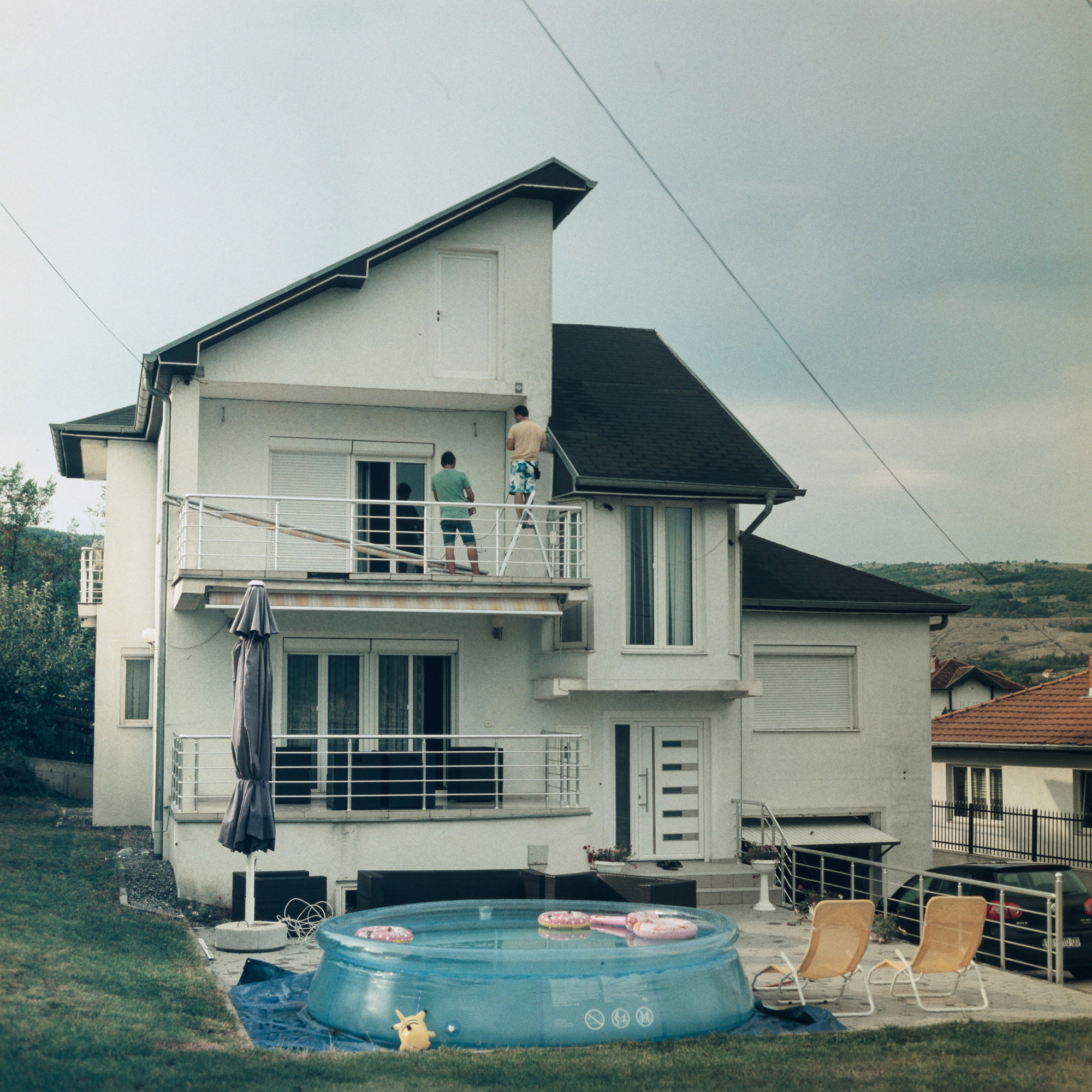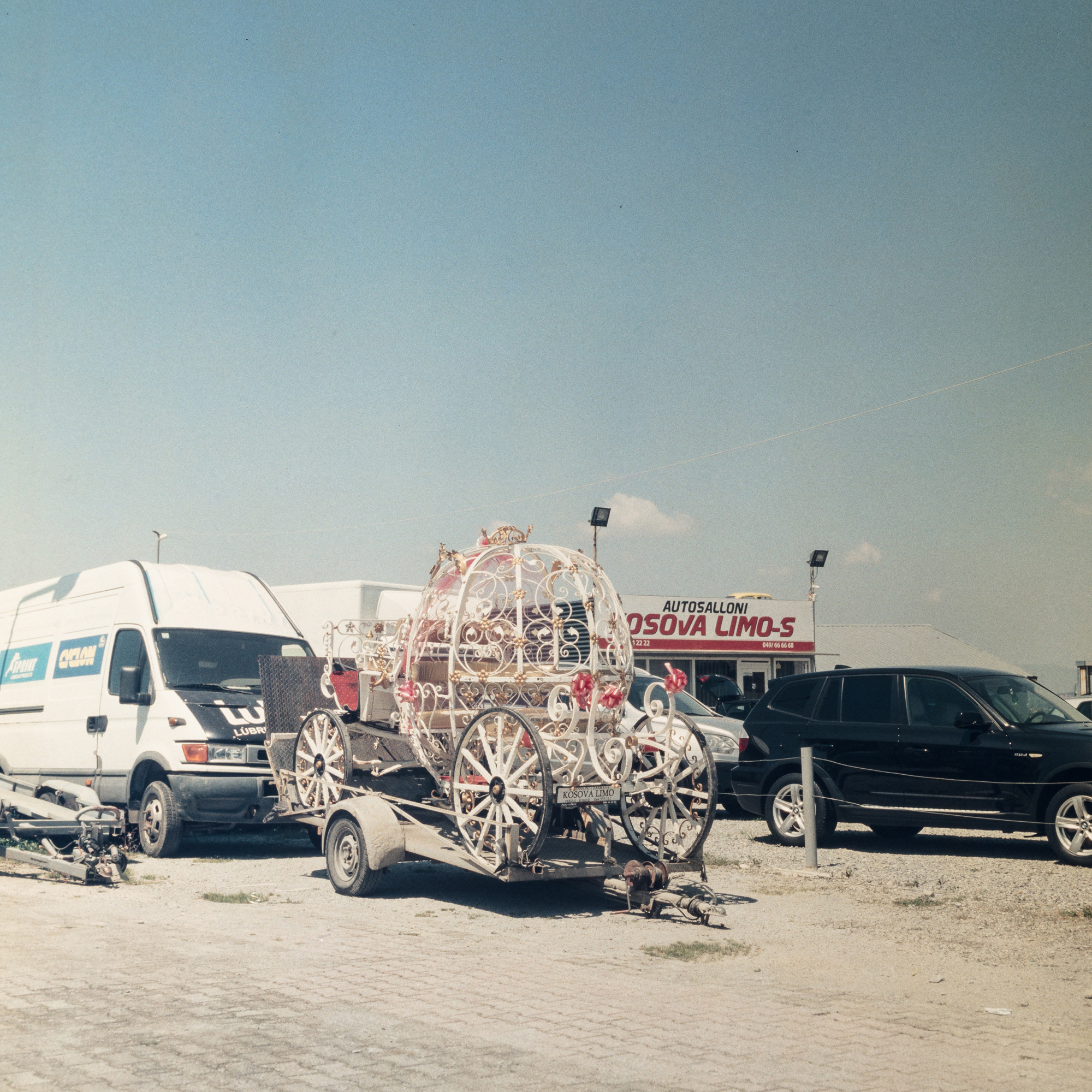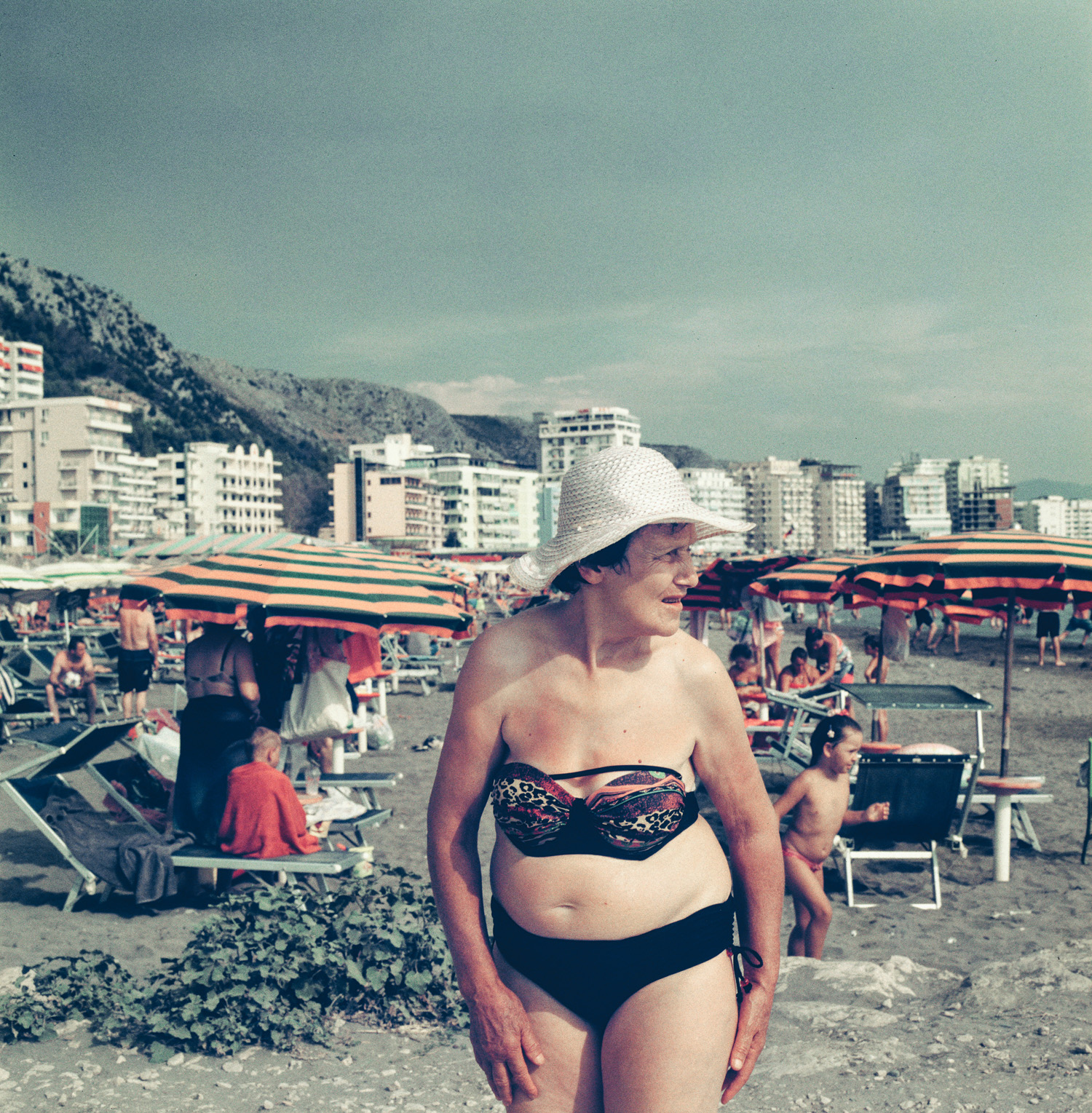14 February 2019
Originally published
01 October 2018
Source
Kosovo – the youngest country in Europe – is still associated with flight, destruction and poverty 20 years after the war. Fewer think of pool parties, pop concerts, luxury weddings and fast cars. And certainly not of people throwing money around in clubs. When the diaspora from Switzerland, Germany and Austria comes home in August, the little Balkan country comes to life again. People celebrate, drink and are getting married. And year after year, those who are left behind realise that their country could not survive without the Schatzis abroad.
Adria Airlines Flight JP 838 is fully booked. Passengers are struggling to find space for their hand baggage aboard the small plane. A young woman wearing a denim jacket and Birkenstock sandals asks her neighbour if she can sit by the window. “Sure,” he says. The man is in his mid-20s and wearing a Hugo Boss shirt and a Diesel watch. He holds out his hand. “Hi, I’m Liridon,” he says. She smiles: “Liridona.” The pair begin to chat – about the Albanian name they share, about the summer they are about to spend in the old country (which is actually a foreign country to them) and about being a Schatzi.
A what? Liridon und Liridona both smile. The word is used a lot in Kosovo. It’s a German term of endearment, meaning “precious” [coll. “sweetheart”]. For Kosovans, it describes members of the diaspora who send money home throughout the year and then visit in the summer. These are Albanians living in places like Vienna, Zurich and Munich, whose relatives have stayed behind in one of Europe’s poorest countries. “My cousins in Kosovo earn 200 euros a month,” says Liridon, who pauses before adding: “I spend that much on a pair of shoes.”
It takes less than 90 minutes for the small plane to cross most of the Western Balkans – Slovenia, Croatia, Bosnia and parts of Serbia and Montenegro. This was once Yugoslavia. When the multinational state fell apart violently in the 1990s, hundreds of thousands of families fled. That’s what happened with Liridon and Liridona – and with most of the passengers on Flight JP 838.
They are Albanians from Kosovo who have spent ten, twenty or more years in Germany, Austria or Switzerland. Many of them began by working on construction sites or in restaurants. They started families and had children. They built homes and learned a new language. At some point, they acquired a new passport. Yet many of them never let go of the old country – however bleak a place it might seem. In the plane, we can tell when we’re flying over Kosovo because the flat ground is suddenly dotted with small cubes. It’s almost as if a giant has been playing with building blocks. A closer look reveals the contours of bare brick houses scattered across the fields. It’s immediately clear which of the homes has a Schatzi in the family – they’re the finished ones with facades, balconies and gardens fences.

Works on a house in Perlepnica. Photo: © Florian Rainer
In terms of surface area, Kosovo is about the size of the Austrian state of Carinthia. It’s home to 1.8 million people, which puts it on a par with Vienna or Hamburg. This makes the diaspora seem enormous, with official figures estimating it at 800,000 people. Unofficially, it could be over a million. The Schatzis regularly send money home – for food, medicine, firewood or house facades. They’re providing something that would normally come from the state. There’s no social security system in Kosovo, so the Schatzis step in to fill the gap for their families. This has created a separate financial system. Since one in three people has a Schatzi abroad and one in four receives money from them, sums rivalling the state budget are accumulating. The central bank in Pristina estimates that Kosovo earns €1.5 billion from its diaspora every year.
The central bank in Pristina estimates that Kosovo earns €1.5 billion from its diaspora every year.
When the Schatzis return in the summer, Kosovo becomes one huge party that seems like it will never end. People drink, celebrate, get married. Sports cars bearing foreign number plates roar through the streets. The clubs stay open until the early morning. Festivals and free concerts are organised. Ferizaj, a city in southern Kosovo, stages a fireworks show over the prefab housing blocks every year in honour of the diaspora. The market square is filled with tables, benches and balloons. A crowd of people stand in front of the stage where a folk singer is performing Albanian pop songs.
A young girl – perhaps 17 years old – who speaks with a heavy Swiss accent stands at the edge of the crowd. She dances the way Albanians dance: with her arms above her head, swaying her hips and looking light as a feather. What’s it like being a Schatzi? She replies immediately: “You’re not at home here, and you’re not at home there.” We’ll hear that a lot during our research, because being a Schatzi isn’t just about prosperity and wealth – it’s also about feeling torn and homesick, and about the difficulties of putting down roots when you live between two worlds. The question of who or what a Schatzi is takes us to dying villages and overcrowded swimming pools. It reveals people who have become world-famous footballers or popstars, and others who have lost everything. It exposes an economic policy run not by ministers but by hundreds of thousands of families. And it raises another question, one on which the fate of an entire state depends: how much longer?
The stars
People often tell Bes Bujupi that he looks Scandinavian. He explains – in his British accent – that he fled Kosovo with his family when he was a child. Bujupi is now a successful graphic designer in London, but today he’s sitting in Soma, a popular hipster restaurant in Pristina with bookshelves lining the walls and a large terrace. The president drinks his morning coffee here. Everyone who’s anyone (or anyone who has money) comes here – artists, journalists, directors, diplomats. Bujupi is not a particular fan of the term Schatzi. He says Schatzis are machos who throw their cash around in clubs. “I don’t want to just carelessly transfer money. I want to bring my expertise here,” he explains. Bujupi organised Pristina’s first design conference.
When a global superstar like Dua Lipa posts photos of parties in Pristina and writes in Albanian about how much she misses her homeland, it has a huge political impact.
This year he was part of the team behind Sunny Hill Festival, which was organised by perhaps the most famous Schatzi of all: Dua Lipa, a British singer with Kosovo-Albanian roots. She lived in Pristina for a number of years and so speaks fluent Albanian. Right now, she’s one of the most popular stars on YouTube and plays sold-out shows around the world. When Dua Lipa lands at Pristina airport, the whole country goes wild. People here don’t just love her for her music, but also for the way she’s making Kosovo’s image – which used to be so negative – shine. Her Instagram account, which has 18 million followers, is worth more to Kosovo than any entry in a guidebook. The war ended 20 years ago, but many people still think traveling here would be dangerous. When a global superstar like Dua Lipa posts photos of parties in Pristina and writes in Albanian about how much she misses her homeland, it has a huge political impact. Kosovo is, after all, fighting for a place on the international stage. Five EU member states – Greece, Slovakia, Cyprus, Spain and Romania – do not recognise Kosovo as a state. Russia and China, both permanent members of the UN Security Council, are preventing Kosovo from joining the UN. “It feels like someone’s built a huge wall around Kosovo,” says Bujupi, regretfully.
The wedding planner
The wall that Bujupi is talking about has a name: visa requirement. Kosovo is the only country in Europe whose citizens are not allowed to travel freely in the region. Although the European Parliament gave the green light for abolishing the visa requirement in September, the chances of it actually happening are not good. EU commissioner Johannes Hahn recently travelled to Pristina to deliver the bad news that the visa requirement will continue to apply in 2019. The bureaucratic hurdles for a visa are huge. As things stand, Kosovans wishing to travel to the EU or Switzerland must fill out multiple forms at the embassy, disclose their bank balance and often wait for months. They also need a good reason for the trip, such as work, university or a sports competition. Visiting relatives in Vienna or Zurich, or being invited to a wedding in Stuttgart aren’t valid reasons. Which is why the diaspora returns to Kosovo to marry instead.

Emma also decided to celebrate her wedding in Kosovo: “Back home, we’d have had to borrow money for a wedding like this”. Photo: © Florian Rainer
Shemsije Dërmaku has turned this into a business model. “If it wasn’t for the diaspora, I’d have never become a wedding planner,” she says. In September 1999, just a few months after the NATO bombing, she organised her first wedding. At the time, it was impossible to find fresh flowers anywhere in the country. People had other concerns – their homes had been destroyed and gutted by fire. In the post-war years, Dermaku’s contacts in the diaspora sent her VHS tapes of American weddings. “That’s exactly the kind of wedding we want – but in Kosovo,” they said. Today, Dërmaku arranges luxury weddings through her company Grand Décor. “Ninety percent of my clients live abroad,” she says. They pay Dërmaku between €1,000 and €5,000 for the perfect venue, flowers imported from Italy, boom-mounted cameras and dry-ice installations.

“Schatzis” who belong to Europe’s middle class come to Kosovo to marry like the superrich – with red carpets, burbling pools, five-tier wedding cakes and opulent flower arrangements. Photo: © Florian Rainer
On this particular weekend, Dërmaku is standing outside a white building with palm trees and kitsch horse statues. It’s like a fake Greek temple you might find in Disneyland. She’s expecting 175 guests. “That’s very small for a Kosovan wedding,” says an employee, who is responsible for showing people to their seats. Today, Emma (28) and Gramoz (30) are tying the knot. In an hour, they will become Mr and Mrs Krasniqi – a surname that is as common in Kosovo as Wagner is in Austria. Gramoz was born in Kosovo but has lived in Sweden since he was a boy. He met Emma at a party when he was a student. “Back home, we’d have had to borrow money for a wedding like this,” they say. There, it would have cost €100,000. Here, it cost €25,000. Most Kosovans would have to save for almost seven years to afford that. Schatzis who belong to Europe’s middle class come to Kosovo to marry like the superrich – with red carpets, burbling pools, five-tier wedding cakes and opulent flower arrangements.
“Little Switzerland”
It was Muhamet Hajrullahu’s birthday on Friday. And because Hajrullahu, CEO of a large property company, has everything he needs, he presented his home town of Gjilan in eastern Kosovo with a gift: a replica of the Statue of Liberty. It’s hard to find a country where people love the US as much as they do in Kosovo. That’s down to the US-led NATO intervention that ended the war in 1999. US troops are still stationed in the country to ensure peace. The chorus of a song that became popular after the war goes: “Thank you, USA, you are my best friend”. So now Gjilan has its own Statue of Liberty. What it really needs, though, are jobs.
In the days of Yugoslavia, the town was full of factories making almost anything you could think of: heating systems, tobacco, bread, textiles. When everything was privatised, the jobs disappeared. Hajrullahu, who left the town to start a company in Germany, is now one of Gjilan’s richest Schatzis. He returned three years ago and made a promise: “I plan to build 2,000 apartments here in the next five years,” he says in perfect German. Construction sites create jobs. Hajrullahu pays his workers €500 per month – that’s €150 above the average. The construction sites are needed because demand for homes is rising. And that’s because the diaspora is buying. So Hajrullahu sells apartments that are only occupied for a few weeks each year.
A widower returns
Empty houses can also be found in Gadime, a village close to the capital in central Kosovo. There’s not much here: a stalactite cave, cornfields, bumpy roads. Neri is a returnee who, with his two little lapdogs and collection of cowboy boots, doesn’t really seem to fit in here. Standing in his living room, he takes a framed photograph from the mantelpiece, looks at it fondly and says, “I’ll never find another woman like her.” In the picture, Neri has long hair and is wearing a leather jacket. He has his arm around a tall, red-haired woman. She and Neri lived a kind of Kosovan dream: they earned money in Switzerland and had a dream home in Kosovo. She worked as a nurse for a rich family. He started out working on construction sites, then as a barman in a club. They saved €45,000 to build a house back home. Then, six years ago, Neri’s wife fell ill. Bowel cancer. Eleven surgeries, countless rounds of chemotherapy.
In Kosovo, being a “Schatzi” is considered a big success. Yet not everyone finds happiness abroad.
When she died, Neri couldn’t find any reason to stay in Switzerland. He felt that his life there was worth nothing without her. So he returned home on a pension of €842. That’s not enough to get by in Switzerland, but it does buy a nice life in Kosovo. Theoretically. “I’ve lost everything,” Neri says. “This house means nothing to me anymore.” He’s surrounded by antique-looking furniture, a flatscreen TV, stereo speakers, his cowboy boot collection. In Kosovo, being a Schatzi is considered a big success. Yet not everyone finds happiness abroad. Neri is one of these broken returnees who worked their whole lives and then at some point asked themselves, “What for?”
Holiday by the sea
In an isolated cove on the Albanian coast, 14-year-old Fisnik is wading into the Adriatic. Mass tourism hasn’t yet turned this part of the sea brown – it’s still a glittering blue. His parents, Zymer (53) and Valbona (45), know where to find the quiet beaches and clean water. For years they’ve been coming here, to Shëngjin, a beach resort in northwest Albania popular among the diaspora. The hotel complexes are full of Kosovan Schatzis. Kosovo and Albania are a bit like two disparate siblings. They share the same language and culture, cheer for the same singers at the Eurovision Song Contest and wave the same black-and-red flag at football matches. Their historical paths, though, have taken different routes. Albania was never part of Yugoslavia. Instead, its Stalinist dictator Enver Hoxha built hundreds of thousands of bunkers that still cover the countryside today, like so many concrete molehills. Albania remained isolated from the rest of Europe until well into the 1990s. In Yugoslavia, however, migrant workers were allowed to travel to Western Europe and experience capitalism. One reason why the term Schatzi never became established in Albania is that people there emigrated to Greece and Italy, where no one speaks German. When the financial and economic crisis hit these countries, the flow of money to Albania waned. The fact that Kosovo’s diaspora system still runs like a well-oiled machine, then, is because its people began emigrating to the richest countries in Europe decades ago.

Many “Schatzis” who visit their relatives in Kosovo spend a part of their holidays at the Albanian coast, as here in Shëngjin. Photo: © Florian Rainer
Valbona and Zymer are sitting in the shade of a beach bar, both wrapped in towels. Here and there, sunbeams break through gaps in the straw roof. It’s 37°C. The sand is smouldering underfoot. The smell of saltwater and grilled fish hovers in the air as they begin to tell their story. Valbona left Kosovo in 1987. By then, the Yugoslavian president Tito had been dead for six years and nationalist feelings had started to bubble up in the multinational state. Valbona moved to Switzerland, where she worked as a cook and then in a biscuit factory. Her husband Zymer had to abandon his degree in Pristina and took a job as a farmhand in Switzerland. Migration has forced many intellectuals to become blue-collar workers. People who wanted to study philosophy or economics had to earn their money on construction sites. The most famous Kosovan to take this path is Ramush Haradinaj. During the 1990s, he worked as a carpenter and bouncer in Switzerland, so you might think that his life is just one of countless other Schatzi episodes. But Haradinaj had a career as a commanding officer during the war – and is now the prime minister of Kosovo. He recently returned to Switzerland for a winter holiday with his family. According to the newspaper Insajderi, they stayed in the Czar Suite at the Carlton Hotel at a cost of €70,000. Haradinaj later claimed that it was actually just €7,000. Yet for anyone on the average Kosovan wage, that’s still an awful lot of money. A normal Kosovan would have to work roughly two years to earn that amount.
Original in German. First published in October 2018 in DATUM.
Translation into English by Jen Metcalf.
This text is protected by copyright: © DATUM / Franziska Tschinderle. If you are interested in republication, please contact the editorial team.
Copyright information on pictures, graphics and videos are noted directly at the illustrations. Cover picture: Spectators at the diaspora party in Ferizaj. Photo: © Florian Rainer